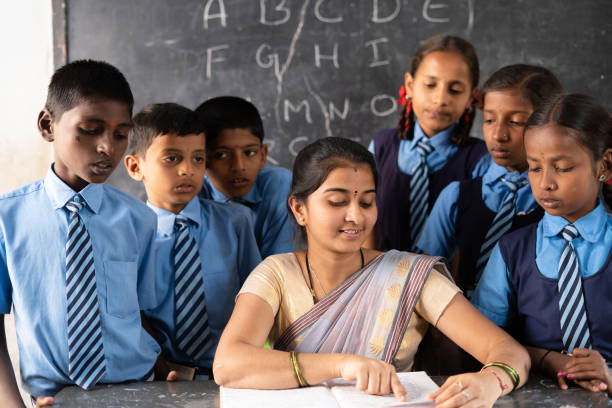The Allahabad High Court’s Lucknow bench has given the go-ahead to the Uttar Pradesh government’s decision to merge primary schools with fewer than 50 students with nearby institutions. While the court said the move was in the interest of better education, the decision has drawn sharp reactions from the Opposition.
On Monday, 7th July, Justice Pankaj Bhatia dismissed a petition filed by a guardian representing 51 students from Sitapur district. The plea had sought a stay on the merger order, claiming that it violated Article 21A of the Constitution, which guarantees free and compulsory education for children between the ages of 6 and 14.
“This Article also mandates that the government will have to set up a primary school within one km for a population of every 300 people so that small children do not have to travel far to reach school”.
The petitioner said the merger would force children to travel longer distances to attend school, putting additional stress on young students, especially those from poor and rural backgrounds.
The state government defends the policy
Representing the state, Additional Advocate General Anuj Kudesia and Chief Standing Counsel Shailendra Kumar Singh told the court that many schools in Uttar Pradesh are either empty or have very few students enrolled. They argued that running such schools is not practical or beneficial for students.
The government said the decision to merge schools was based on improving access to better educational facilities, teachers, and peer learning. By shifting students from small, under-enrolled schools to bigger institutions, the state hopes to provide a better academic environment.
According to official data, UP has around 1.40 lakh government-run primary and upper primary schools. Out of these, nearly 29,000 schools have fewer than 50 students, and around 89,000 teachers are posted in these institutions. The government says the policy aims to use these resources more effectively.
Opposition slams the decision as “Anti-Education”
Samajwadi Party President Akhilesh Yadav strongly criticised the move, calling it a deliberate conspiracy to weaken public education in rural areas. In a post on X (formerly Twitter), he accused the BJP-led government of trying to deprive future generations, especially children from backwards, Dalit, and minority communities, of their right to education.
शिक्षा ही विकास की सबसे बड़ी कसौटी होती है। भाजपा सरकार में शिक्षा और शिक्षकों की जो उपेक्षा हो रही है उसके पीछे एक गहरी साज़िश की ये आशंका बलवती हो रही है कि :
– भाजपा आनेवाली पीढ़ी से ‘शिक्षा का अधिकार’ छीनना चाहती है।
– जो शिक्षित होता है वह सकारात्मक भी होता है और सहनशील… pic.twitter.com/ajajYwi5Zn— Akhilesh Yadav (@yadavakhilesh) July 3, 2025
“Education is the biggest threat to authoritarian politics. The BJP doesn’t want children to become aware and self-confident because educated people question injustice and stand up against wrong policies,” Yadav wrote.
“No schools, No opposition”: Akhilesh Yadav
The former chief minister expressed fears that closing government schools in villages could pave the way for BJP-affiliated organisations to open their institutions “under the garb of service,” where they could allegedly propagate “divisive ideologies.”
Yadav further accused the ruling party of fostering a crowd of “uneducated, superstitious, and unscientific minds” that could be easily manipulated.
He also pointed out that if a polling booth can be set up for one voter, a school for 30 students should be just as important.
He further alleged that closing down government schools would pave the way for private schools run by BJP-affiliated organisations to enter rural areas, where they could promote divisive ideologies under the guise of service.
Kannauj schools also face closure
Yadav also shared a news report from Kannauj, which claimed that 38 schools in the district are facing the threat of closure due to the new policy. He warned that this is not an isolated incident and that similar actions may follow in other districts too.
Government says it’s about better education
Sources from the UP government say the policy is not about closing schools but about rationalising resources, improving the student-teacher ratio, and enhancing overall academic outcomes. They argue that merging small schools will help deliver quality education, particularly in rural areas.
Officials have said that students who have to move will be relocated to nearby schools within accessible distances, and logistical support will be provided where necessary.
Verdict triggers political heat
With the court backing the state’s decision, the school merger policy is set to go forward. However, the strong political reactions show that this will remain a contentious issue in the coming months, especially with the Opposition accusing the government of hurting the education rights of marginalised communities.


